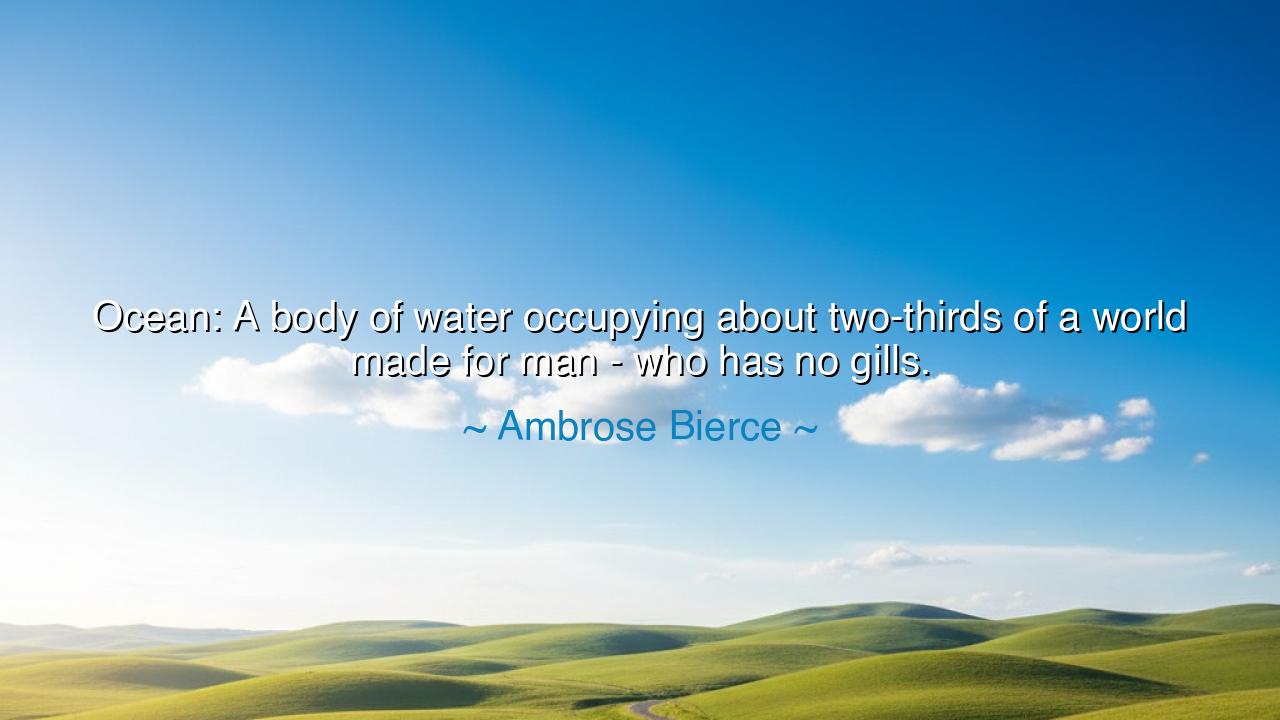
Ocean: A body of water occupying about two-thirds of a world
Ocean: A body of water occupying about two-thirds of a world made for man - who has no gills.






Ambrose Bierce, with the sharp wit of his Devil’s Dictionary, once defined: “Ocean: A body of water occupying about two-thirds of a world made for man — who has no gills.” At first glance, these words may seem but a jest, a mockery of human vanity. Yet beneath the irony there lies a deeper truth. Bierce reminds us of the paradox of existence: that the world, vast and mighty, is not shaped to man’s convenience. The ocean, covering most of the earth, remains alien to us, unconquerable, and hostile to our very breath. We may call the earth our home, but two-thirds of it is a realm in which we cannot live.
This is a humbling lesson. For too often, mankind has proclaimed that the world was “made for man,” the crown of creation. Yet Bierce, with biting irony, points to the obvious: if the earth were truly fashioned for man’s comfort, would it not be covered in fertile plains and gentle rivers, rather than in the unfathomable depths of the sea? The ocean is both majesty and menace. It feeds us with its bounty of fish, carries our ships upon its surface, but it also drowns without pity and hides mysteries no empire can subdue. Thus, in its immensity, it teaches us humility.
The ancients saw this long before Bierce. The Greeks spoke of Poseidon, god of the sea, a power feared even by Zeus himself. Sailors prayed before voyages, knowing that the ocean was not theirs to command. The story of Odysseus, tossed for ten years across stormy waters, is the eternal reminder that man may master many things, but not the sea. Even Rome, mistress of the world, trembled before tempests, and learned that her legions could not march upon waves. The ocean is the frontier that mocks man’s dominion.
History offers sobering testimony. Think of the Titanic, hailed as unsinkable, a triumph of human engineering. Yet in a single night, the ocean proved otherwise, swallowing ship and soul alike. Or consider Magellan, who crossed the great Pacific, not with ease, but through hunger, disease, and storms. Each voyage that expands man’s knowledge also expands his awareness of his own frailty. Bierce’s humor strikes at this very tension: we live upon a world whose greater part remains forever inhospitable to us, for we have no gills.
The meaning is not despair but clarity. Bierce’s satire cuts away illusion. We are not masters of the earth, nor is it built solely for our comfort. The ocean reminds us that life is not meant to be easy; it is meant to be endured, explored, and respected. The irony of our design — that we cannot breathe in water — is also the spur to our ingenuity. We have built ships, invented diving bells, submarines, and suits, all because the ocean withholds its secrets. Our lack drives our creativity. Our weakness births our strength.
The lesson for us, then, is twofold. First, walk in humility, for the world is larger and mightier than you. Do not assume it was fashioned for your ease. Respect the ocean, respect nature, respect the vastness that lies beyond your control. Second, let your limits become the spark of invention. Where you cannot breathe, learn to float; where you cannot conquer, learn to navigate. The ocean will never be your home, but it can be your path, your teacher, and your mirror.
Practically, this means embracing both reverence and resilience. Stand by the shore and let the waves remind you of your smallness. Let that smallness humble your pride, but also awaken your courage. Do not shrink from challenges simply because they are inhospitable. Like the explorers of old, venture forth with respect and daring. The ocean will always remain beyond full mastery, but in striving against it, man discovers himself.
Thus, Ambrose Bierce’s jest becomes wisdom: “Ocean: A body of water occupying about two-thirds of a world made for man — who has no gills.” Hear in it the laughter of irony, but also the cry of truth. The world was not built for our comfort, but for our growth. The ocean, vast and merciless, is the reminder that greatness is not given but earned — and that humility before creation is the first step to wisdom.






AAdministratorAdministrator
Welcome, honored guests. Please leave a comment, we will respond soon